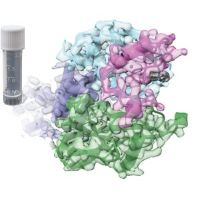Specification
| Description | Recombinant protein from the full-length sequence of Homo sapiens ubiquitin conjugating enzyme E2 T (UBE2T), transcript variant 1 (NM_014176). |
| Organism | Homo sapiens (Human) |
| Expression Host | Human Cells |
| Tag Info | His or DYKDDDDK. Please contact us if you need further information or require specific designed tag. |
| Purity | Greater than 90% by SDS-PAGE gel |
| Uniprot ID | Q9NPD8 |
| Entry Name | UBE2T_HUMAN |
| Gene Names | UBE2T HSPC150 PIG50 |
| Alternative Gene Names | |
| Alternative Protein Names | Ubiquitin-conjugating enzyme E2 T (EC 2.3.2.23) (Cell proliferation-inducing gene 50 protein) (E2 ubiquitin-conjugating enzyme T) (Ubiquitin carrier protein T) (Ubiquitin-protein ligase T) |
| Application | Antigens, Western, ELISA and other in vitro binding or in vivo functional assays, and protein-protein interaction studies; For research & development use only! |
| Buffer | Purified protein formulated in a sterile solution of PBS buffer, pH7.2, without any preservatives |
| Endotoxin | Endotoxin level is < 0.1 ng/µg of protein (<1EU /µg) |
| Length | 197 |
| Molecular Weight(Da) | 22521 |
| Protein Sequence | (The sequence of expressed protein may have some variation from the sequence shown below. Please contact us for the exact sequence.) MQRASRLKRELHMLATEPPPGITCWQDKDQMDDLRAQILGGANTPYEKGVFKLEVIIPERYPFEPPQIRFLTPIYHPNIDSAGRICLDVLKLPPKGAWRPSLNIATVLTSIQLLMSEPNPDDPLMADISSEFKYNKPAFLKNARQWTEKHARQKQKADEEEMLDNLPEAGDSRVHNSTQKRKASQLVGIEKKFHPDV |
Background
| Function | FUNCTION: Accepts ubiquitin from the E1 complex and catalyzes its covalent attachment to other proteins. Catalyzes monoubiquitination. Involved in mitomycin-C (MMC)-induced DNA repair. Acts as a specific E2 ubiquitin-conjugating enzyme for the Fanconi anemia complex by associating with E3 ubiquitin-protein ligase FANCL and catalyzing monoubiquitination of FANCD2, a key step in the DNA damage pathway (PubMed:16916645, PubMed:17938197, PubMed:19111657, PubMed:19589784, PubMed:28437106). Also mediates monoubiquitination of FANCL and FANCI (PubMed:16916645, PubMed:17938197, PubMed:19111657, PubMed:19589784). May contribute to ubiquitination and degradation of BRCA1 (PubMed:19887602). In vitro able to promote polyubiquitination using all 7 ubiquitin Lys residues, but may prefer 'Lys-11'-, 'Lys-27'-, 'Lys-48'- and 'Lys-63'-linked polyubiquitination (PubMed:20061386). {ECO:0000269|PubMed:16916645, ECO:0000269|PubMed:17938197, ECO:0000269|PubMed:19111657, ECO:0000269|PubMed:19589784, ECO:0000269|PubMed:19887602, ECO:0000269|PubMed:20061386, ECO:0000269|PubMed:28437106}. |
| Pathway | Protein modification; protein ubiquitination. |
| Protein Families | Ubiquitin-conjugating enzyme family |
| Tissue Specificity |
QC Data
| Note | Please contact us for QC Data |
| Product Image (Reference Only) |  |

